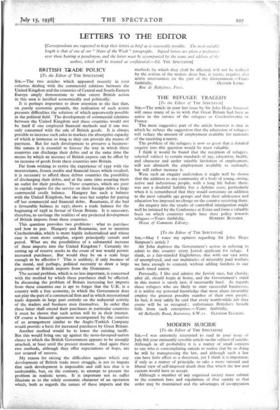BRITISH TRADE POLICY LETTERS TO THE EDITOR
[Correspondents are requested to keep their letters as brief as is reasonably possible. The most suitable length is that of one of our " News of the Week " paragraphs. Signed letters are given a preference over those bearing a pseudonym, and the latter must be accompanied by the name and address of the author, which will be treated as confidential.—Ed. THE SPECTATOR] [To the Editor of THE SPECTATOR] SIR,—The two articles which appeared recently in your columns dealing with the commercial relations between the United Kingdom and the countries of Central and South-Eastern Europe amply demonstrate to what extent British action in this area is justified economically and politically.
It is perhaps important to draw attention to the fact that, on purely economic grounds, the realisation of such action presents difficulties the solution of which appears only possible in the political field. The development of commercial relations between the United Kingdom and these countries would not be hard if one employed financial methods and if one was only concerned with the sale of British goods. It is always, possible to increase such sales in markets the absorptive capacity of which is immense so long as they can provide the means of payment. But for such development to preserve a business- like nature it is essential to foresee the way in which these countries can discharge their debts and at the same time the means by which an increase of British exports can be offset by an increase of goods from these countries into Britain.
Far from wishing to revive the experience of 193/ with the moratoriums, frozen credits and financial losses which resulted, it is necessary to afford these debtor countries the possibility of discharging their debts, and at the same time assuring them an outlet for their produce. These countries, which are poor in capital, require for the service on their foreign debts a large commercial credit balance. Hungary has such a balance with the United Kingdom, but she uses her surplus for paying off her commercial and financial debts. Roumania, if she had a favourable balance in 1937, shows a trade balance for the beginning of 1938 in favour of Great Britain. It is -necessary, therefore, to envisage the realities of any projected development of British imports from these countries.
This question provokes two problems : what to purchase and how to pay. Hungary and Roumania, not to mention Czechoslovakia, which is more highly industrialised and whose case is even more complex, export principally cereals and petrol. What are the possibilities of a substantial increase of these imports into the United Kingdom ? Certainly the setting up of reserve stocks in the event of war would permit increased purchases. But would they be on a scale large enough to be effective ? This is unlikely, if only because of the moral, and perhaps, political, necessity to draw a large proportion of British imports from the Dominions.
The second problem, which is no less important, is concerned with the method by which these purchases shall be effected. In discussing the problem of Britain increasing her imports from these countries one is apt to forget that the U.K. is a country with a free economy, in which the Government does not play the part of a commercial firm and in which international trade depends in large part entirely on the industrial activity of the traders and business men themselves. In order that these latter shall extend their purchases in particular countries it must be shown that such action will be in their interest. Of course a financial agreement accompanied by the creation of an arrangement similar to the Anglo-Turkish Company would provide a basis for increased purchases by Great Britain.
Another method would be to lower the existing tariffs. But this would bring one up against the most-favoured-nation clause to which the British Government appears to be strongly attached, at least until the present moment. And again these two methods, although they offer expectations of hope, are not assured of success.
My reason for raising the difficulties against which any development of British trade must struggle, is not to impute that such development is impossible- and still less that it is undesirable, but, on the contrary, to attempt to present the problem in realistic terms. It is important not to. suffer illusions as to- the solely economic character of an operation which, both as regards the nature of these imports and the methods by which they shall be affected, will not be realise3 by the actions of the traders alone but, it seems, requires also active intervention on the part of the Government.—Youri Rue de Babylone, Paris.










































 Previous page
Previous page